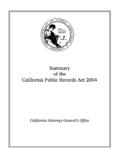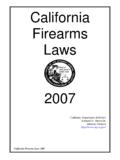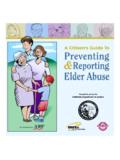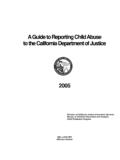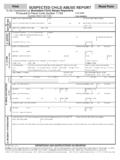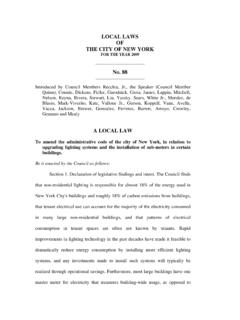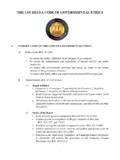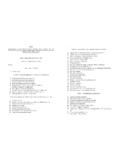Transcription of THE BROWN ACT - Attorney General of California
1 2003 California Attorney General s Office THEBROWNACTTHE BROWN ACT Open MEETINGS FOR local LEGISLATIVE BODIES THE BROWN ACT Open MEETINGS FOR local LEGISLATIVE BODIES Office of the Attorney General Bill Lockyer Attorney General Prepared by the Division of Civil Law Chief Assistant Attorney General Andrea Lynn Hoch Deputy Attorney General Ted Prim, Editor State of California Office of the Attorney General Bill Lockyer Attorney General Throughout California s history, local legislative bodies have played a vital role in bringing participatory democracy to the citizens of the state. local legislative bodies - such as boards, councils and commissions - are created in recognition of the fact that several minds are better than one, and that through debate and discussion, the best ideas will emerge.
2 The law which guarantees the public s right to attend and participate in meetings of local legislative bodies is the Ralph M. BROWN Act. While local legislative bodies generally are required to hold meetings in open forum, the BROWN Act recognizes the need, under limited circumstances, for these bodies to meet in private in order to carry out their responsibilities in the best interests of the public. For example, the law contains a personnel exception based on notions of personal privacy, and a pending litigation exception based upon the precept that government agencies should not be disadvantaged in planning litigation strategy.
3 Although the principle of open meetings initially seems simple, application of the law to real life situations can prove to be quite complex. The purpose of this pamphlet is to provide a brief description of the BROWN Act, along with a discussion of court decisions and opinions of this office that add to our understanding by applying it in specific factual contexts. We hope this pamphlet will assist both public officials and those who monitor the performance of local legislative bodies to minimize and resolve disputes over interpretations of the BROWN Act. In recent years, both the California Supreme Court and the courts of appeal have recognized the benefit of pamphlets issued by our office.
4 This recognition by the courts, along with many favorable comments from members of the public, strengthens our resolve to continue producing reliable informational materials on the BROWN Act and other California laws. Publication of these materials constitutes a tradition of service that we value greatly. Ideas and suggestions for future editions of this pamphlet are welcomed and should be addressed to the editor. Sincerely, BILL LOCKYER Attorney General 1300 I Street Suite 1740 Sacramento, California 95814 Table of Contents Page INTRODUCTION v SUMMARY OF KEY BROWN ACT PROVISIONS vi I. PURPOSE AND SCOPE 1 II. BODIES SUBJECT TO THE BROWN ACT 2 1.
5 local Agencies 3 2. Legislative Bodies 4 A. Governing Bodies 5 B. Subsidiary Bodies 5 C. Private or Nonprofit Corporations and Other Entities 6 D. Hospital Lessees 7 III. MEETING DEFINED 8 1. Face to Face Meetings 8 A. Conferences and Retreats 9 B. Other Public Meetings 10 C. Meetings of Other Legislative Bodies 10 D. Social or Ceremonial Occasions 11 2. Serial Meetings 11 3. Individual Contacts Between Members of the Public and Board Members 13 4. Teleconference Meetings 14 5. Writings as Meetings 15 i Table of Contents (Continued) Page IV.
6 NOTICE AND AGENDA REQUIREMENTS 15 1. Regular Meetings 16 A. Agenda Requirement 16 B. Exceptions to Agenda Requirements 18 C. Public Testimony 18 2. Special Meetings 20 3. Emergency Meetings 20 4. Closed Sessions 21 A. Agenda Requirement 21 B. Oral Announcement Prior to Closed Sessions 23 C. Report at the Conclusion of Closed Sessions 24 5. Adjournments and Continuances 25 6. Location of Meetings 26 7. Special Procedures Regarding Taxes and Assessments 27 V. RIGHTS OF THE PUBLIC 27 VI. PERMISSIBLE CLOSED SESSIONS 30 1. Introduction 30 A. Narrow Construction 30 B. Semi-Closed Meetings 31 C.
7 Secret Ballots 31 D. Confidentiality of Closed Session 32 ii Table of Contents (Continued) Page 2. Authorized Exceptions 33 A. Personnel Exception 33 B. Pending Litigation and the Attorney -Client Privilege 37 (1) Historical Background 37 (2) Pending Litigation Exception 37 C. Real Property Negotiations Exception 41 D. Labor Negotiations Exception 42 E. Public Security Exception 43 F. License Application Exception 43 3. Minute Book 43 VII. PENALTIES AND REMEDIES FOR VIOLATION OF THE ACT 44 1. Criminal Penalties 44 2. Civil Remedies 44 A. Injunctive, Mandatory or Declaratory Relief 44 B.
8 Voidability of Action 45 C. Attorney Fees 47 APPENDIX A 49 TIME DEADLINES 49 APPENDIX B 50 THE RALPH M. BROWN ACT 51 iii Table of Contents (Continued) Page TABLE OF AUTHORITIES 84 Cases 85 Statutes 88 Attorney General Opinions 92 Other Authorities 94 iv INTRODUCTION This pamphlet concerns the provisions of the Ralph M. BROWN Act, which govern open meetings for local government bodies. The BROWN Act is contained in section 54950 et seq. of the Government Code. Accordingly, all statutory references in this pamphlet are to the Government Code unless otherwise noted. The pamphlet contains a table of contents, which may also serve as a topical outline for the reader.
9 The pamphlet also includes a brief summary of the main provisions of the BROWN Act, along with references to the appropriate Government Code sections and chapters of the text. The text includes a discussion of the law along with tips on how the law should be applied in particular situations. Numerous references are made to legal authorities throughout the text. A copy of the BROWN Act in its entirety is set forth in the appendix to the pamphlet. Lastly, the pamphlet contains a table of authorities so that the reader can determine all of the places in the text where references are made to a particular authority. In preparing this pamphlet, we relied on a variety of legal resources.
10 Appellate court cases were consulted and are cited throughout the pamphlet. While most of the more significant cases are discussed, this pamphlet is not intended to be a compendium of all court cases in this area. In addition, we drew upon published opinions and unpublished letter opinions issued by this office. Attorney General opinions, unlike appellate court decisions, are advisory only and do not constitute the law of the state. However, with respect to the BROWN Act, the courts have frequently adopted the analysis of Attorney General opinions, and have commented favorably on the service afforded by those opinions and this pamphlet.
